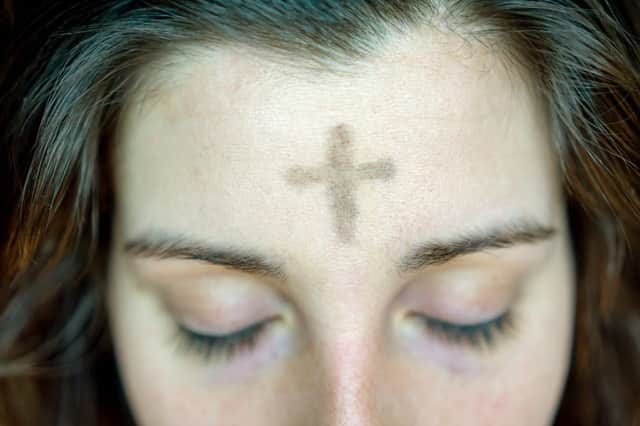Here's when Ash Wednesday falls this year and why people observe the first day of Lent


Shrove Tuesday, otherwise known as Pancake Day, might be a more widely celebrated occasion for pretty obvious reasons, but the day after is just as significant for many people.
With Shrove Tuesday out of the way and the cupboard emptied of delicious, pancake-making things, many religious people will turn their attention to more serious matters on Ash Wednesday, as they begin a period of fasting and reflection.
Here’s everything you need to know about Ash Wednesday.
What is Ash Wednesday?
Advertisement
Hide AdAdvertisement
Hide AdAsh Wednesday represents the beginning of Lent – the six weeks (or roughly 40 days) before Easter in which Christians remember the 40 days and nights that Jesus Christ spent wandering in the desert.
Ash Wednesday itself is widely observed by Christians in the West, regardless of their denomination – Catholics, Lutherans, Methodists, Anglicans and most other major sects all commemorate it in one way or another.
When does Ash Wednesday fall in 2020?
Shrove Tuesday is always exactly 47 days before Easter, meaning it falls on 25 February this year.
Ash Wednesday takes place the following day, on Wednesday 26 February 2020.
How is Ash Wednesday observed?
Advertisement
Hide AdAdvertisement
Hide AdThe name “Ash Wednesday” comes from the traditional practice of placing repentance ashes on the forehead, often in the shape of a cross and usually while reciting either “Repent and believe in the Gospel” or “Remember that you are dust and to dust you will return”.
The ashen markings are symbols of mourning, emblems of the sins of man and the sorrows they have caused. They also act as reminders of man’s own mortality (“to dust you will return”) and the need to repent for their own sins while they can.
The ashes themselves traditionally come from burning the palm leaves at the previous week’s Palm Sunday celebration.
To honour Christ’s sacrifices, many Christians “give up” something for the duration of Lent – usually a food or drink of some kind, although other enjoyable luxuries and “vices” like smoking or gambling can also be chosen.
Advertisement
Hide AdAdvertisement
Hide AdThe pancake feasts of Shrove Tuesday were designed as a way to rid the house of sweet temptations before the long period of sombre restraint begins.
The French named this day “Mardi Gras” or “Fat Tuesday” and it is widely celebrated there and in the US as a final day of utter indulgence in an attempt to make the prospect of 40 luxury-free days more palatable.
Many Christians will also try to renew their focus on prayer and charitable efforts during this time, foregoing worldly pleasures in favour of re-enforcing their spiritual connections.
This could mean going to church more or simply acting more mindfully in day-to-day life.
Advertisement
Hide AdAdvertisement
Hide AdAs part of their Lent ritual, many Christians will fast until sunset on Ash Wednesday and also on Good Friday (the Friday immediately before Easter Sunday).
Some will continue to do so throughout the entirety of Lent.
Roman Catholics will typically honour Ash Wednesday by fasting, abstaining from eating meat and spending the day in contemplation of their own past sins.
This article originally appeared on our sister site, The Scotsman.